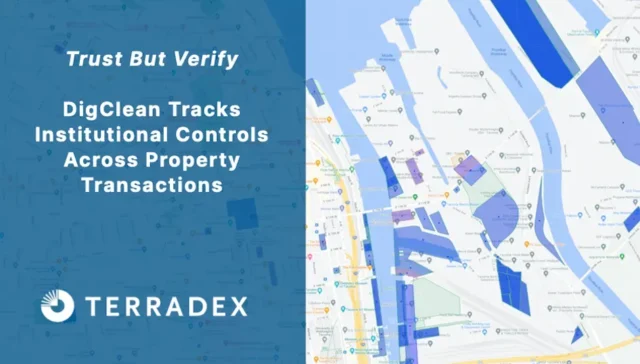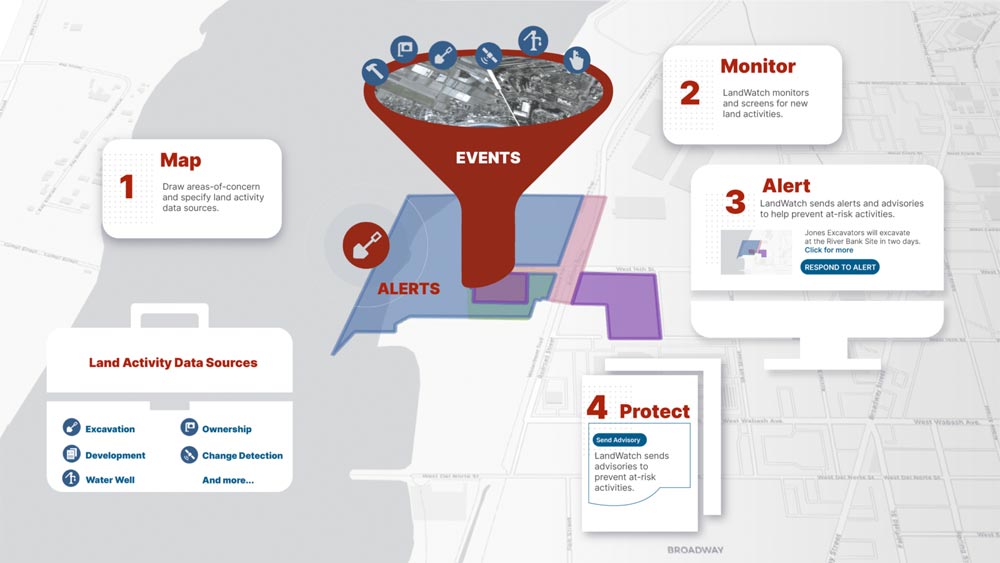
Welcome to
Terradex
MAP · MONITOR · ALERT · PROTECT
Welcome to
Terradex
MAP · MONITOR · ALERT · PROTECT
Our Technology
MAP. MONITOR. ALERT. PROTECT.
Terradex’s proprietary technology continuously maps and monitors cleanup remedies, alerts parties of any land use risks, and delivers a long-term reliable strategy for protecting individuals, communities, and the environment. We are constantly innovating to ensure our products meet the evolving needs of our clients.

Map
Monitor
Alert
Protect

Our Solutions
Standing alone or used in combination, our application suite solves the unique problems related to contaminated or environmentally sensitive land stewardship.
LandWatch™
Primarily used for contaminated site stewardship, LandWatch continuously monitors selected land activity, sends alerts, and provides powerful mapping and compliance-assistance reporting tools.
Learn MoreDigClean
Geared to excavation monitoring, DigClean sends Environmental Safety Advisories that warn about site risks.
Learn MoreWhatsDown
Prior to invasive site work, WhatsDown provides on-demand environmental and safety screening reports.
Learn MoreWho We Serve
We serve industrial, utility, and government clients worldwide, helping them meet their land stewardship obligations and achieve their sustainability goals.

Industry
Our industrial clients are owners of legacy contaminated sites that face compliance and liability challenges when residuals persist onsite or offsite after a cleanup.


A Unique Problem
A need exists to monitor activity on and around contaminated sites and other sensitive lands.

Innovative, Integrated Solutions
Our proprietary web technologies continuously monitor for new land uses, and integrate effortlessly into our clients’ risk management workflows.

Proven Success
For nearly twenty years, large companies and government agencies have used our technology to minimize risk, prioritize safety, and ensure compliance with property use restrictions.

Domain Expertise
Our experts tailor our technology solutions to fit specific client needs while also driving us forward to constantly update our applications to meet the evolving needs of site stewardship.
Who We Serve
We serve industrial, utility, and government clients worldwide, helping them meet their land stewardship obligations and achieve their sustainability goals.
Industry
Our industrial clients are owners of legacy contaminated sites that face compliance and liability challenges when residuals persist onsite or offsite after a cleanup.
Utilities
Utilities face the same challenges as our industrial clients but have the additional risk of sending field crews to sites where they can encounter contamination left by others.
Government
The state environmental agencies we serve enforce compliance and facilitate public communication about contaminated sites or properties containing institutional controls.
Telling the Terradex Story
THE MONITOR BLOG


Position Announcement: Sales Associate
Interested in Learning More About Our Solutions
Get Our LandWatch Product Sheet
Interested in learning more about LandWatch?
Additional information is available in the downloadable product sheet below.
Request a Demo
Please contact us to schedule a LandWatch demo to see how we can help you with your stewardship needs.
